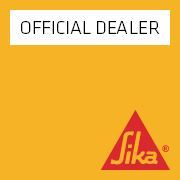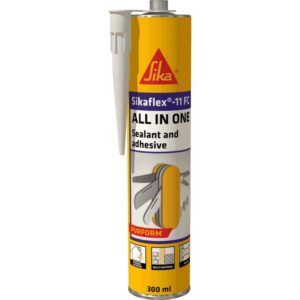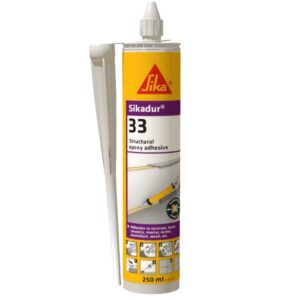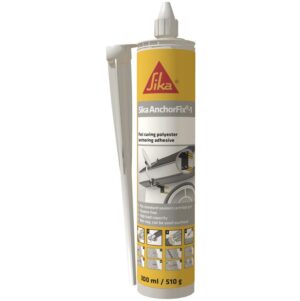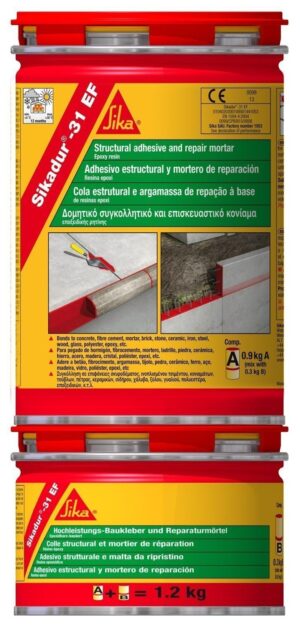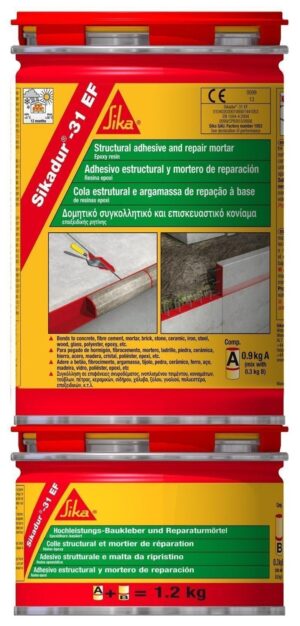What is a chemical anchor?
The terms chemical anchor and resin anchor are used to describe bolts, steel studs and anchorages bonded into a layer of concrete or masonry with the use of a resin based adhesive system. In most cases the bond which results from chemical anchoring is stronger than the base material, making this method ideal for high-load applications.
Since the system is based on chemical adhesion, chemical anchors are perfect for reduced centre and group anchoring, edge fixing and are used in concrete of low compressive strength or unknown quality. Unlike expansion anchors, no load stress is imparted to the base of the material when chemical anchoring is used.
What types of chemical resins are available?
Due to the vast array of resins available on the market, it could often be difficult for someone new to chemical anchors to comprehend the difference. There are three main types of resin anchors – unsaturated polyester, epoxy acrylate (or Vinyl ester) and pure epoxy – as well as hybrid systems. While unsaturated polyester resins offer fast and easy process ability, and epoxy resins boast great mechanical and thermal properties, epoxy acrylate combines the valuable qualities of the two.
When should you use chemical fixings and resin anchors?
The most common situations for using chemical anchors includes avoiding the splitting or cracking of masonry on a wall which could result from drilling or using screws to fix other materials to brick or stone walls. If prepared correctly, chemical anchors are very sturdy and can hold massive loads.
What is an epoxy adhesive?
Epoxies are the polymerised mixture of a resin and a hardener, where the bonds formed between the two components are key to dictating the strength and the rigidity of epoxy adhesive. Their high strength, resistance to chemicals and environments, their ability to adhere to a variety of materials and resist creep under sustained load makes epoxy adhesive the most widely used structural adhesives.
The chemical, thermal and electrical resistance, as well as the mechanical strength properties of epoxy adhesives, can be altered by the choice of resin and hardener compounds and by monitoring the preparation process. Most epoxy adhesives include modifiers which aim to increase the toughness or flexibility of the cured system.
The specific characteristics of epoxy adhesives are determined by the specific chemistry of the mixtures, but some of the key performance requirements for epoxies include extraordinary heat and chemical resistance, exceptional water resistance and adhesion, as well as superb mechanical and electrical insulation properties.
What are the types of epoxy adhesives?
Epoxy adhesives are one of the more commonly used structural adhesives, and are widely sold as either one component or two component systems. One component epoxy adhesives are characterised by their high strength adhesion to metals and their outstanding resistance to harsh chemicals and extreme environment. One component epoxy adhesives are often used as a substitute to rivets and welding.
Two component epoxy adhesives, such as Sikadur 33, feature superior properties as a result of the different preparation method – extremely versatile, they can be used for sealing, bonding, encapsulation and coasting across a number of industries such as aerospace, electronics and medical devices. Two component epoxy adhesives are suitable for bonding most surfaces – from wood and metal to class, ceramic and plastic, as well as many kinds of rubber. It can withstand constant weight or force over a long period, and is resistant to chemical and physical influences, high temperature and fire which is why they are considered highly stable.
What are the best uses of epoxy adhesive?
Epoxy adhesives are often used to repair fibreglass, the bodies of livestock trailers and passenger cars. They are also used to laminate plywood with fibreglass to increase the durability and strength of the construction.
Epoxy adhesives are widely utilised in carpentry and woodworking as a substitute for wood glue, especially when building cabinets or other wooden furniture, which makes them especially handy for emergency situations. They could also be used to reinforce wood glue as a secondary adhesive.
Epoxy adhesives can also work well as metal and wood fillers to repair rust or wood rot. They can be used to reinforce fasteners – for instance, when applied in bolting vibrating machinery to a concrete floor, the epoxy will protect bolts from corrosion, delay stress-induced cracking and strengthen the joint.

